#include <OpusEncoder.h>


Public Member Functions | |
| OpusEncoder () | |
| virtual | ~OpusEncoder () Q_DECL_OVERRIDE |
| virtual bool | open (QWidget *widget, const Kwave::FileInfo &info, Kwave::MultiTrackReader &src) Q_DECL_OVERRIDE |
| virtual bool | writeHeader (QIODevice &dst) Q_DECL_OVERRIDE |
| virtual bool | encode (Kwave::MultiTrackReader &src, QIODevice &dst) Q_DECL_OVERRIDE |
| virtual void | close () Q_DECL_OVERRIDE |
 Public Member Functions inherited from Kwave::OggSubEncoder Public Member Functions inherited from Kwave::OggSubEncoder | |
| virtual | ~OggSubEncoder () |
Private Types | |
| enum | { DOWNMIX_OFF = -1, DOWNMIX_AUTO = 0, DOWNMIX_MONO = 1, DOWNMIX_STEREO = 2 } |
Private Member Functions | |
| bool | setupDownMix (QWidget *widget, unsigned int tracks, int bitrate) |
| bool | setupBitrate (QWidget *widget, unsigned int tracks) |
| bool | setupCodingRate (QWidget *widget, unsigned int tracks, double rate) |
| bool | setupEncoder (QWidget *widget, unsigned int tracks, double rate) |
| bool | setupBitrateMode (QWidget *widget) |
| bool | writeOpusHeader (QIODevice &dst) |
| bool | writeOpusTags (QIODevice &dst) |
| bool | writeOggPage (QIODevice &dst) |
| unsigned int | fillInBuffer (Kwave::MultiTrackReader &src) |
Private Attributes | |
| Kwave::VorbisCommentMap | m_comments_map |
| Kwave::FileInfo | m_info |
| ogg_stream_state | m_os |
| ogg_page | m_og |
| ogg_packet | m_op |
| enum Kwave::OpusEncoder:: { ... } | m_downmix |
| int | m_bitrate |
| int | m_coding_rate |
| unsigned int | m_encoder_channels |
| Kwave::ChannelMixer * | m_channel_mixer |
| Kwave::StreamObject * | m_rate_converter |
| unsigned int | m_frame_size |
| unsigned int | m_extra_out |
| Kwave::opus_header_t | m_opus_header |
| unsigned int | m_max_frame_bytes |
| unsigned char * | m_packet_buffer |
| OpusMSEncoder * | m_encoder |
| float * | m_encoder_input |
| Kwave::StreamObject * | m_last_queue_element |
| Kwave::MultiTrackSink< Kwave::SampleBuffer, true > * | m_buffer |
Detailed Description
Definition at line 47 of file OpusEncoder.h.
Member Enumeration Documentation
◆ anonymous enum
|
private |
downmix mode: off, automatic, mono or stereo
| Enumerator | |
|---|---|
| DOWNMIX_OFF | no downmixing |
| DOWNMIX_AUTO | automatic, based on bitrate |
| DOWNMIX_MONO | downmix to mono |
| DOWNMIX_STEREO | downmix to stereo |
Definition at line 183 of file OpusEncoder.h.
Constructor & Destructor Documentation
◆ OpusEncoder()
| Kwave::OpusEncoder::OpusEncoder | ( | ) |
Constructor
Definition at line 96 of file OpusEncoder.cpp.
References m_opus_header.
◆ ~OpusEncoder()
|
virtual |
Member Function Documentation
◆ close()
|
virtual |
finished the encoding, clean up
Implements Kwave::OggSubEncoder.
Definition at line 974 of file OpusEncoder.cpp.
References m_buffer, m_channel_mixer, m_encoder, m_encoder_input, m_last_queue_element, m_os, m_packet_buffer, and m_rate_converter.
◆ encode()
|
virtual |
encode received ogg data
- Parameters
-
src MultiTrackReader used as source of the audio data dst a QIODevice that receives the raw data
- Returns
- true if succeeded, false if failed
Implements Kwave::OggSubEncoder.
Definition at line 829 of file OpusEncoder.cpp.
References DBG, fillInBuffer(), Kwave::MultiTrackReader::isCanceled(), Kwave::FileInfo::length(), m_coding_rate, m_encoder, m_encoder_channels, m_encoder_input, m_frame_size, m_info, m_max_frame_bytes, m_og, m_op, m_opus_header, m_os, m_packet_buffer, Kwave::opus_error(), Kwave::FileInfo::rate(), Kwave::toUint(), and writeOggPage().
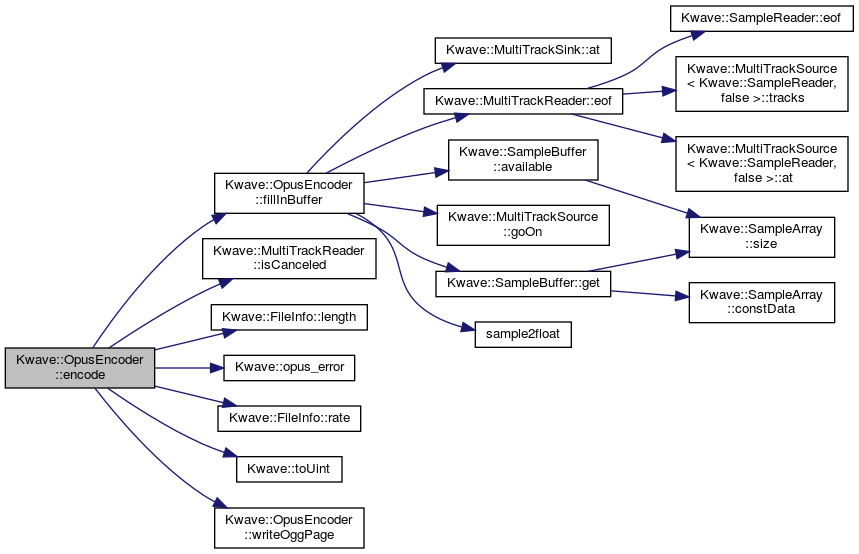
◆ fillInBuffer()
|
private |
Fill the input buffer of the encoder with samples.
- Parameters
-
src MultiTrackReader used as source of the audio data
- Returns
- number of samples read
Definition at line 772 of file OpusEncoder.cpp.
References Kwave::MultiTrackSink< SINK, INITIALIZE >::at(), Kwave::SampleBuffer::available(), Kwave::MultiTrackReader::eof(), Kwave::SampleBuffer::get(), Kwave::MultiTrackSource< SOURCE, INITIALIZE >::goOn(), m_buffer, m_encoder_channels, m_encoder_input, m_extra_out, m_frame_size, and sample2float().
Referenced by encode().
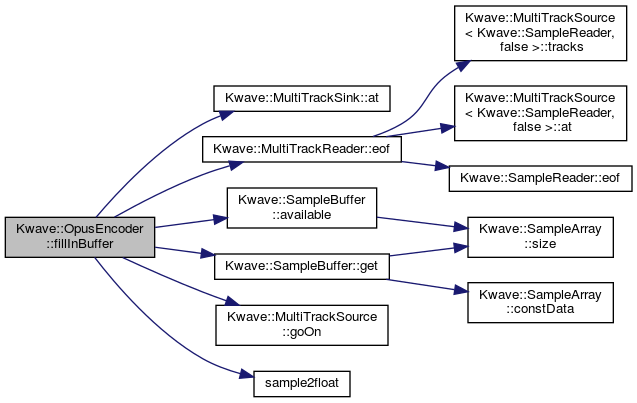

◆ open()
|
virtual |
parse the header of the stream and initialize the decoder
- Parameters
-
widget a QWidget to be used as parent for error messages info reference to a FileInfo to fill src MultiTrackReader used as source of the audio data
- Returns
- true if succeeded, false if failed
Implements Kwave::OggSubEncoder.
Definition at line 501 of file OpusEncoder.cpp.
References Kwave::FileInfo::bits(), Kwave::connect(), DBG, DEFAULT_COMPLEXITY, DOWNMIX_AUTO, Kwave::MessageBox::error(), m_bitrate, m_buffer, m_coding_rate, m_downmix, m_encoder, m_encoder_channels, m_extra_out, m_frame_size, m_info, m_last_queue_element, m_max_frame_bytes, m_opus_header, m_os, Kwave::opus_error(), Kwave::FileInfo::rate(), setupBitrate(), setupBitrateMode(), setupCodingRate(), setupDownMix(), setupEncoder(), and Kwave::FileInfo::tracks().
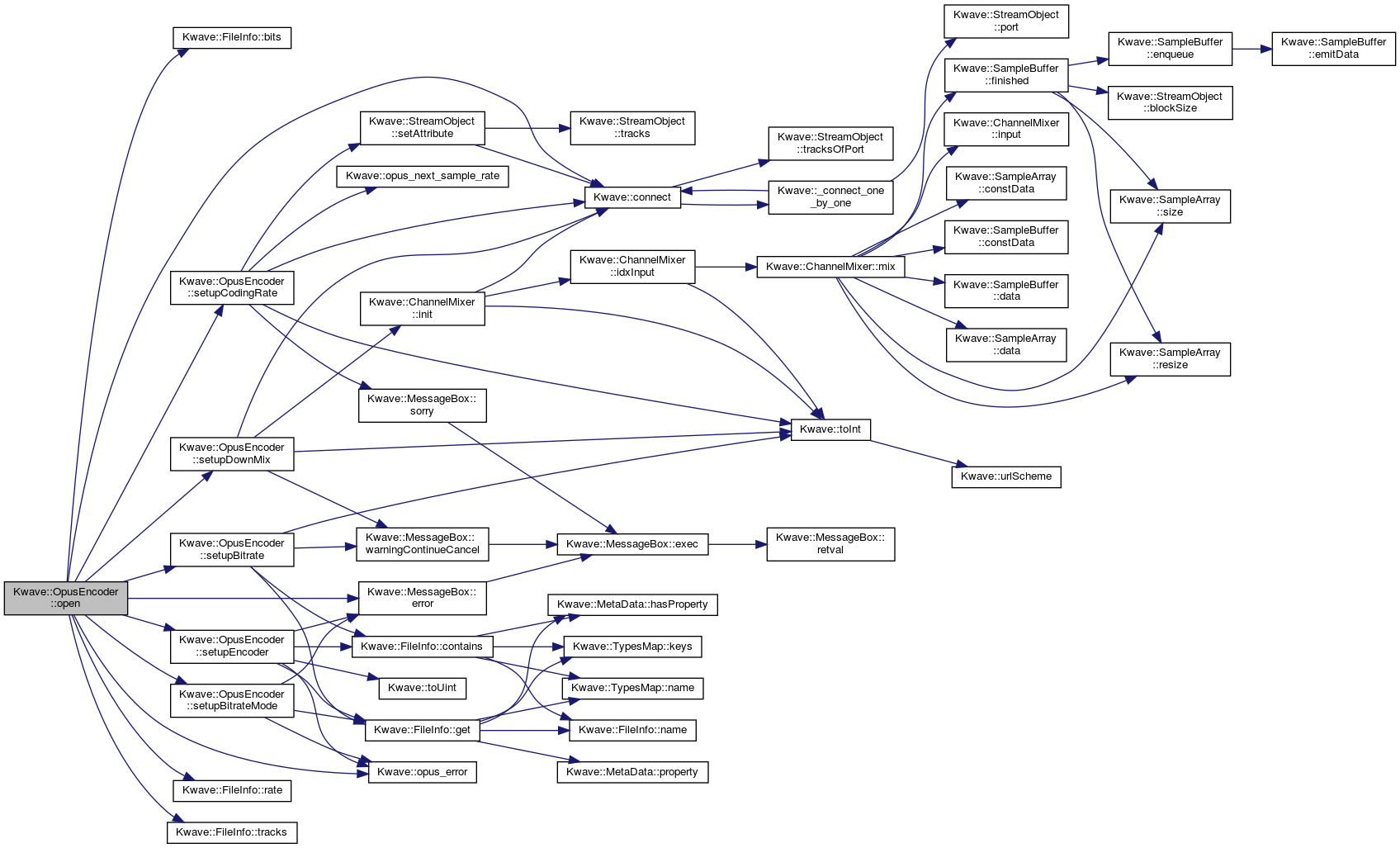
◆ setupBitrate()
|
private |
determine the bitrate to use for encoding
- Parameters
-
widget a QWidget to be used as parent for error messages tracks number of tracks
- Returns
- true if succeeded or false if failed/canceled
Definition at line 195 of file OpusEncoder.cpp.
References _, BITRATE_MAX, BITRATE_MIN, Kwave::FileInfo::contains(), Kwave::FileInfo::get(), Kwave::INF_BITRATE_LOWER, Kwave::INF_BITRATE_NOMINAL, Kwave::INF_BITRATE_UPPER, m_bitrate, m_info, Kwave::toInt(), and Kwave::MessageBox::warningContinueCancel().
Referenced by open().
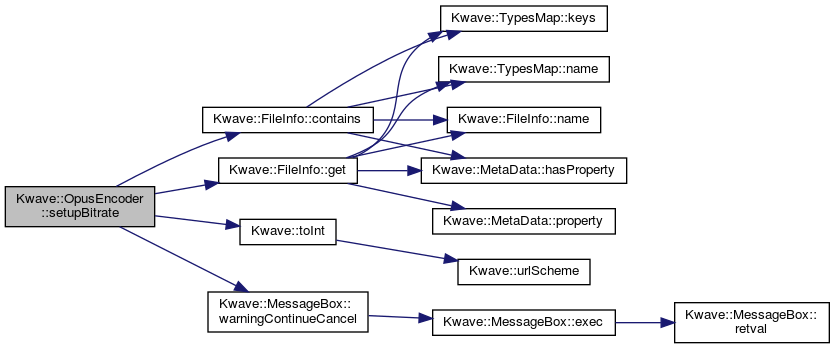

◆ setupBitrateMode()
|
private |
set up the bitrate mode, e.g. VBR, CBR etc
- Parameters
-
widget a QWidget to be used as parent for error messages
- Returns
- true if succeeded or false if failed/canceled
Definition at line 452 of file OpusEncoder.cpp.
References Kwave::BITRATE_MODE_CBR_HARD, Kwave::MessageBox::error(), Kwave::FileInfo::get(), Kwave::INF_BITRATE_MODE, m_bitrate, m_encoder, m_info, m_opus_header, and Kwave::opus_error().
Referenced by open().
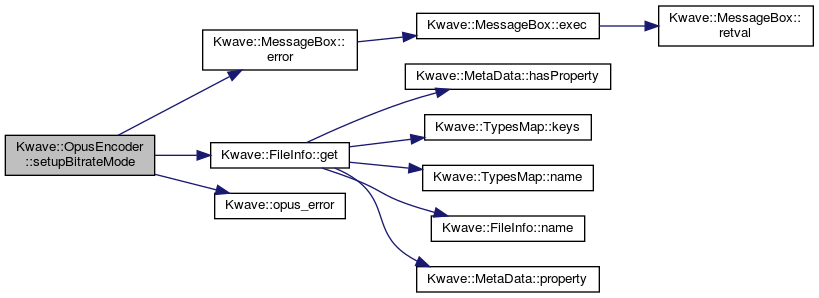

◆ setupCodingRate()
|
private |
determine the sample rate to use for encoding
- Parameters
-
widget a QWidget to be used as parent for error messages tracks number of tracks rate sample rate of the original in samples/sec
- Returns
- true if succeeded or false if failed/canceled
Definition at line 238 of file OpusEncoder.cpp.
References Kwave::connect(), m_coding_rate, m_last_queue_element, m_rate_converter, Kwave::opus_next_sample_rate(), SAMPLE_RATE_MAX, SAMPLE_RATE_MIN, Kwave::StreamObject::setAttribute(), Kwave::MessageBox::sorry(), and Kwave::toInt().
Referenced by open().


◆ setupDownMix()
|
private |
set up the downmixing mode
- Parameters
-
widget a QWidget to be used as parent for error messages tracks number of tracks bitrate in bits/sec or -1 for "auto"
- Returns
- true if succeeded or false if failed/canceled
Definition at line 126 of file OpusEncoder.cpp.
References _, Kwave::connect(), DOWNMIX_AUTO, DOWNMIX_MONO, DOWNMIX_OFF, DOWNMIX_STEREO, Kwave::ChannelMixer::init(), m_channel_mixer, m_downmix, m_encoder_channels, m_last_queue_element, Kwave::toInt(), and Kwave::MessageBox::warningContinueCancel().
Referenced by open().
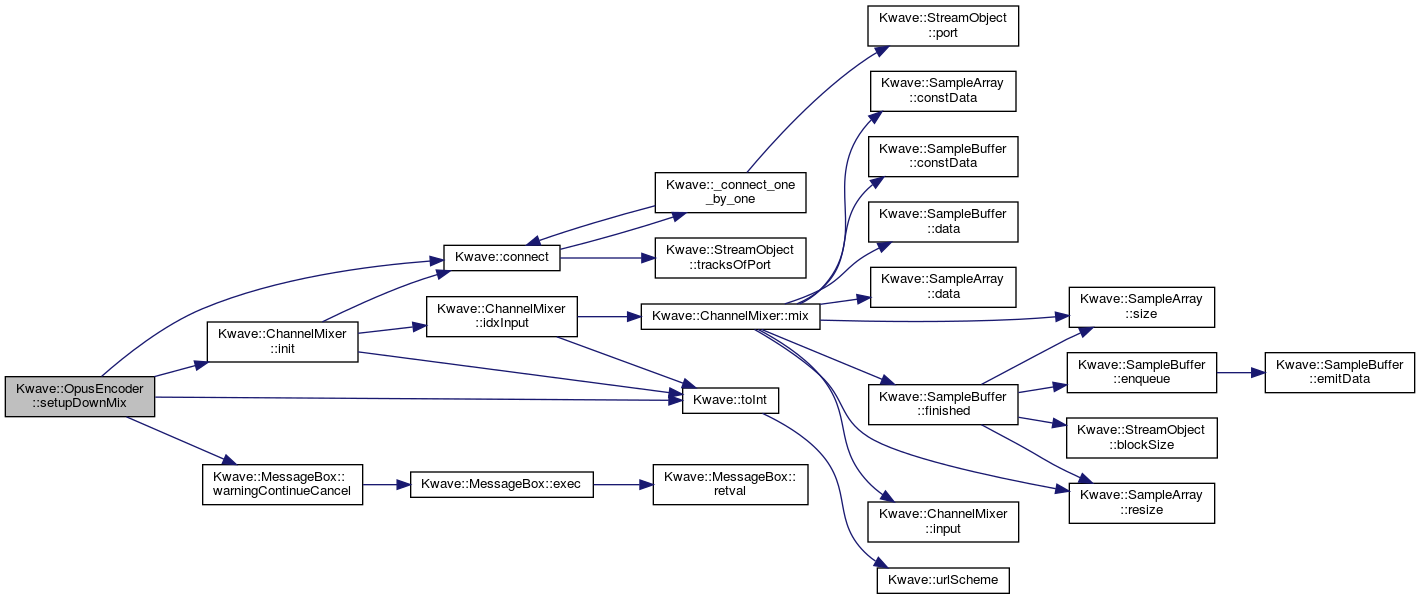

◆ setupEncoder()
|
private |
set up the encoder, including packet size and channel mapping
- Parameters
-
widget a QWidget to be used as parent for error messages tracks number of tracks rate sample rate of the original in samples/sec
- Returns
- true if succeeded or false if failed/canceled
Definition at line 308 of file OpusEncoder.cpp.
References Kwave::FileInfo::contains(), Kwave::MessageBox::error(), Kwave::FileInfo::get(), Kwave::INF_OPUS_FRAME_LEN, m_coding_rate, m_encoder, m_encoder_input, m_frame_size, m_info, m_max_frame_bytes, m_opus_header, m_packet_buffer, Kwave::opus_error(), and Kwave::toUint().
Referenced by open().
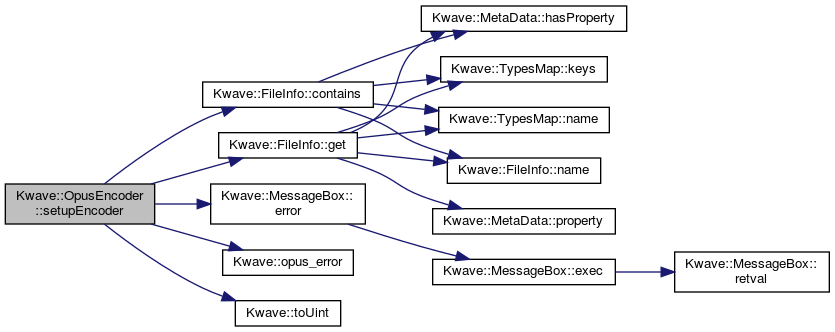

◆ writeHeader()
|
virtual |
write the header information
- Parameters
-
dst a QIODevice that receives the raw data
- Returns
- true if succeeded, false if failed
Implements Kwave::OggSubEncoder.
Definition at line 733 of file OpusEncoder.cpp.
References writeOpusHeader(), and writeOpusTags().

◆ writeOggPage()
|
private |
Write the current ogg page to the destination IO device
- Parameters
-
dst a QIODevice that receives the raw data
- Returns
- true if succeeded or false if failed/canceled
Definition at line 745 of file OpusEncoder.cpp.
References m_og.
Referenced by encode(), and writeOpusTags().

◆ writeOpusHeader()
|
private |
write the Opus header into the Ogg stream
- Parameters
-
dst a QIODevice that receives the raw data
- Returns
- true if succeeded or false if failed/canceled
Definition at line 626 of file OpusEncoder.cpp.
References m_og, m_op, m_opus_header, and m_os.
Referenced by writeHeader().

◆ writeOpusTags()
|
private |
write the Opus tags into the Ogg stream
- Parameters
-
dst a QIODevice that receives the raw data
- Returns
- true if succeeded or false if failed/canceled
Definition at line 673 of file OpusEncoder.cpp.
References _, _writeInt(), Kwave::FileInfo::contains(), Kwave::FileInfo::get(), Kwave::INF_SOFTWARE, m_comments_map, m_info, m_og, m_op, m_os, and writeOggPage().
Referenced by writeHeader().
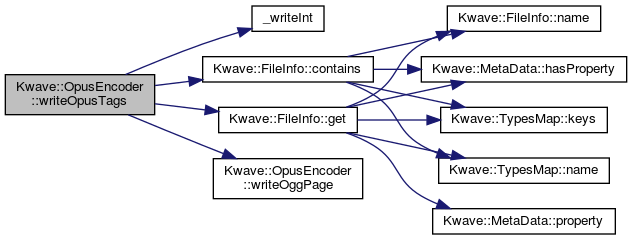

Member Data Documentation
◆ m_bitrate
|
private |
bitrate in bits/sec
Definition at line 191 of file OpusEncoder.h.
Referenced by open(), setupBitrate(), and setupBitrateMode().
◆ m_buffer
|
private |
multi track buffer, for blockwise reading from the source device
Definition at line 234 of file OpusEncoder.h.
Referenced by close(), fillInBuffer(), and open().
◆ m_channel_mixer
|
private |
channel mixer (if downmixing is required)
Definition at line 200 of file OpusEncoder.h.
Referenced by close(), and setupDownMix().
◆ m_coding_rate
|
private |
encoding sample rate in bits/sec
Definition at line 194 of file OpusEncoder.h.
Referenced by encode(), open(), setupCodingRate(), and setupEncoder().
◆ m_comments_map
|
private |
map for translating Opus comments to Kwave FileInfo
Definition at line 166 of file OpusEncoder.h.
Referenced by writeOpusTags().
◆ m_downmix
| enum { ... } Kwave::OpusEncoder::m_downmix |
downmix mode: off, automatic, mono or stereo
Referenced by open(), and setupDownMix().
◆ m_encoder
|
private |
the Opus multistream encoder
Definition at line 221 of file OpusEncoder.h.
Referenced by close(), encode(), open(), setupBitrateMode(), and setupEncoder().
◆ m_encoder_channels
|
private |
number of tracks used for encoding, after downmixing
Definition at line 197 of file OpusEncoder.h.
Referenced by encode(), fillInBuffer(), open(), and setupDownMix().
◆ m_encoder_input
|
private |
input buffer of the encoder
Definition at line 224 of file OpusEncoder.h.
Referenced by close(), encode(), fillInBuffer(), and setupEncoder().
◆ m_extra_out
|
private |
number of samples to pad at the end to compensate preskip
Definition at line 209 of file OpusEncoder.h.
Referenced by fillInBuffer(), and open().
◆ m_frame_size
|
private |
frame size in samples
Definition at line 206 of file OpusEncoder.h.
Referenced by encode(), fillInBuffer(), open(), and setupEncoder().
◆ m_info
|
private |
file info, set in open(...)
Definition at line 169 of file OpusEncoder.h.
Referenced by encode(), open(), setupBitrate(), setupBitrateMode(), setupEncoder(), and writeOpusTags().
◆ m_last_queue_element
|
private |
end of the queue that possibly consists of a channel mixer (in case of downmixing), a rate converter (if needed) and a buffer (if one of the two objects mentioned before is present).
Definition at line 231 of file OpusEncoder.h.
Referenced by close(), open(), setupCodingRate(), and setupDownMix().
◆ m_max_frame_bytes
|
private |
maximum number of bytes per frame
Definition at line 215 of file OpusEncoder.h.
Referenced by encode(), open(), and setupEncoder().
◆ m_og
|
private |
one Ogg bitstream page. Opus packets are inside
Definition at line 175 of file OpusEncoder.h.
Referenced by encode(), writeOggPage(), writeOpusHeader(), and writeOpusTags().
◆ m_op
|
private |
one raw packet of data for decode
Definition at line 178 of file OpusEncoder.h.
Referenced by encode(), writeOpusHeader(), and writeOpusTags().
◆ m_opus_header
|
private |
Opus header, including channel map
Definition at line 212 of file OpusEncoder.h.
Referenced by encode(), open(), OpusEncoder(), setupBitrateMode(), setupEncoder(), and writeOpusHeader().
◆ m_os
|
private |
take physical pages, weld into a logical stream of packets
Definition at line 172 of file OpusEncoder.h.
Referenced by close(), encode(), open(), writeOpusHeader(), and writeOpusTags().
◆ m_packet_buffer
|
private |
buffer for one packet
Definition at line 218 of file OpusEncoder.h.
Referenced by close(), encode(), and setupEncoder().
◆ m_rate_converter
|
private |
sample rate converter (if needed)
Definition at line 203 of file OpusEncoder.h.
Referenced by close(), and setupCodingRate().
The documentation for this class was generated from the following files:
- plugins/codec_ogg/OpusEncoder.h
- plugins/codec_ogg/OpusEncoder.cpp
